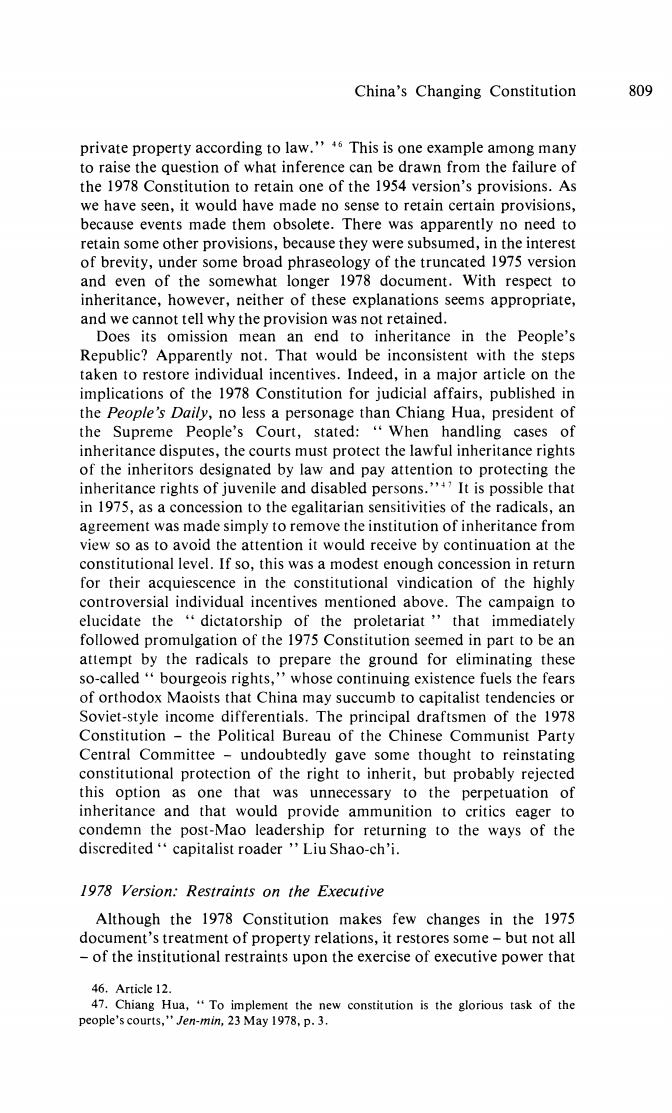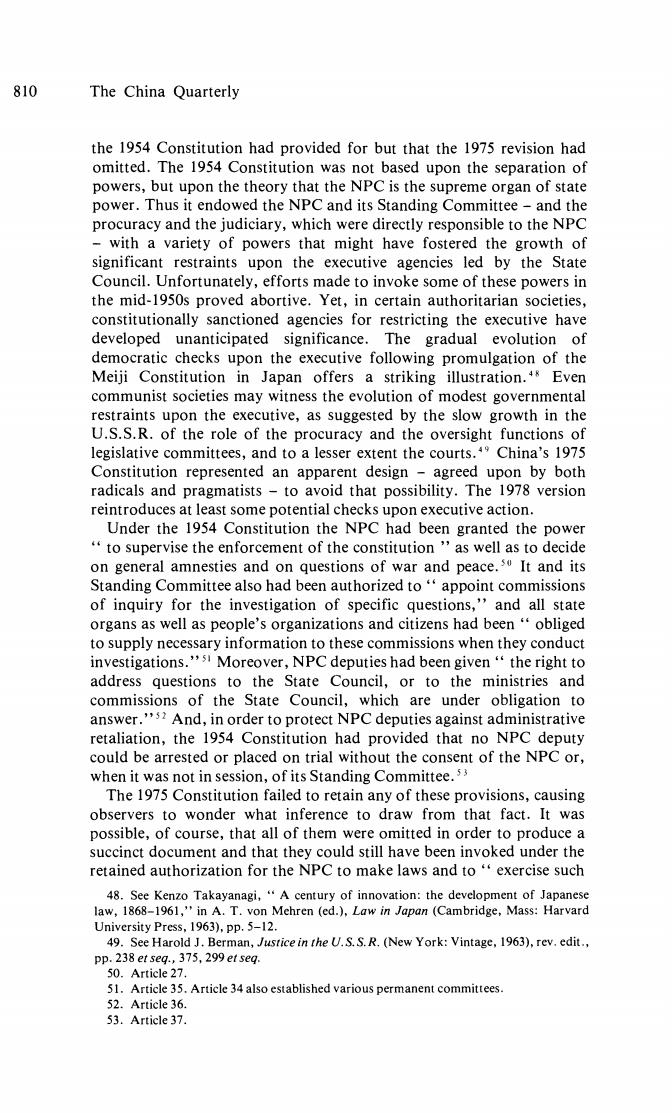
China's Changing Constitution 809 private property according to law.''46 This is one example among many to raise the question of what inference can be drawn from the failure of the 1978 Constitution to retain one of the 1954 version's provisions.As we have seen,it would have made no sense to retain certain provisions, because events made them obsolete.There was apparently no need to retain some other provisions,because they were subsumed,in the interest of brevity,under some broad phraseology of the truncated 1975 version and even of the somewhat longer 1978 document.With respect to inheritance,however,neither of these explanations seems appropriate, and we cannot tell why the provision was not retained. Does its omission mean an end to inheritance in the People's Republic?Apparently not.That would be inconsistent with the steps taken to restore individual incentives.Indeed,in a major article on the implications of the 1978 Constitution for judicial affairs,published in the People's Daily,no less a personage than Chiang Hua,president of the Supreme People's Court,stated:"When handling cases of inheritance disputes,the courts must protect the lawful inheritance rights of the inheritors designated by law and pay attention to protecting the inheritance rights of juvenile and disabled persons."It is possible that in 1975,as a concession to the egalitarian sensitivities of the radicals,an agreement was made simply to remove the institution of inheritance from view so as to avoid the attention it would receive by continuation at the constitutional level.If so,this was a modest enough concession in return for their acquiescence in the constitutional vindication of the highly controversial individual incentives mentioned above.The campaign to elucidate the "dictatorship of the proletariat"'that immediately followed promulgation of the 1975 Constitution seemed in part to be an attempt by the radicals to prepare the ground for eliminating these so-called"bourgeois rights,''whose continuing existence fuels the fears of orthodox Maoists that China may succumb to capitalist tendencies or Soviet-style income differentials.The principal draftsmen of the 1978 Constitution -the Political Bureau of the Chinese Communist Party Central Committee undoubtedly gave some thought to reinstating constitutional protection of the right to inherit,but probably rejected this option as one that was unnecessary to the perpetuation of inheritance and that would provide ammunition to critics eager to condemn the post-Mao leadership for returning to the ways of the discredited"capitalist roader ''Liu Shao-ch'i. 1978 Version:Restraints on the Executive Although the 1978 Constitution makes few changes in the 1975 document's treatment of property relations,it restores some-but not all of the institutional restraints upon the exercise of executive power that 46.Article 12. 47.Chiang Hua,"To implement the new constitution is the glorious task of the people's courts,"Jen-min,23 May 1978,p.3
China's Changing Constitution 809 private property according to law." 46 This is one example among many to raise the question of what inference can be drawn from the failure of the 1978 Constitution to retain one of the 1954 version's provisions. As we have seen, it would have made no sense to retain certain provisions, because events made them obsolete. There was apparently no need to retain some other provisions, because they were subsumed, in the interest of brevity, under some broad phraseology of the truncated 1975 version and even of the somewhat longer 1978 document. With respect to inheritance, however, neither of these explanations seems appropriate, and we cannot tell why the provision was not retained. Does its omission mean an end to inheritance in the People's Republic? Apparently not. That would be inconsistent with the steps taken to restore individual incentives. Indeed, in a major article on the implications of the 1978 Constitution for judicial affairs, published in the People's Daily, no less a personage than Chiang Hua, president of the Supreme People's Court, stated: " When handling cases of inheritance disputes, the courts must protect the lawful inheritance rights of the inheritors designated by law and pay attention to protecting the inheritance rights of juvenile and disabled persons." 4 7 It is possible that in 1975, as a concession to the egalitarian sensitivities of the radicals, an agreement was made simply to remove the institution of inheritance from view so as to avoid the attention it would receive by continuation at the constitutional level. If so, this was a modest enough concession in return for their acquiescence in the constitutional vindication of the highly controversial individual incentives mentioned above. The campaign to elucidate the " dictatorship of the proletariat " that immediately followed promulgation of the 1975 Constitution seemed in part to be an attempt by the radicals to prepare the ground for eliminating these so-called " bourgeois rights," whose continuing existence fuels the fears of orthodox Maoists that China may succumb to capitalist tendencies or Soviet-style income differentials. The principal draftsmen of the 1978 Constitution - the Political Bureau of the Chinese Communist Party Central Committee - undoubtedly gave some thought to reinstating constitutional protection of the right to inherit, but probably rejected this option as one that was unnecessary to the perpetuation of inheritance and that would provide ammunition to critics eager to condemn the post-Mao leadership for returning to the ways of the discredited " capitalist roader " Liu Shao-ch'i. 1978 Version: Restraints on the Executive Although the 1978 Constitution makes few changes in the 1975 document's treatment of property relations, it restores some - but not all - of the institutional restraints upon the exercise of executive power that 46. Article 12. 47. Chiang Hua, " To implement the new constitution is the glorious task of the people's courts," Jen-min, 23 May 1978, p. 3

810 The China Quarterly the 1954 Constitution had provided for but that the 1975 revision had omitted.The 1954 Constitution was not based upon the separation of powers,but upon the theory that the NPC is the supreme organ of state power.Thus it endowed the NPC and its Standing Committee-and the procuracy and the judiciary,which were directly responsible to the NPC with a variety of powers that might have fostered the growth of significant restraints upon the executive agencies led by the State Council.Unfortunately,efforts made to invoke some of these powers in the mid-1950s proved abortive.Yet,in certain authoritarian societies, constitutionally sanctioned agencies for restricting the executive have developed unanticipated significance.The gradual evolution of democratic checks upon the executive following promulgation of the Meiji Constitution in Japan offers a striking illustration.Even communist societies may witness the evolution of modest governmental restraints upon the executive,as suggested by the slow growth in the U.S.S.R.of the role of the procuracy and the oversight functions of legislative committees,and to a lesser extent the courts.China's 1975 Constitution represented an apparent design -agreed upon by both radicals and pragmatists to avoid that possibility.The 1978 version reintroduces at least some potential checks upon executive action. Under the 1954 Constitution the NPC had been granted the power "to supervise the enforcement of the constitution "'as well as to decide on general amnesties and on questions of war and peace.s It and its Standing Committee also had been authorized toappoint commissions of inquiry for the investigation of specific questions,"and all state organs as well as people's organizations and citizens had been"obliged to supply necessary information to these commissions when they conduct investigations.''s Moreover,NPC deputies had been given"the right to address questions to the State Council,or to the ministries and commissions of the State Council,which are under obligation to answer."52 And,in order to protect NPC deputies against administrative retaliation,the 1954 Constitution had provided that no NPC deputy could be arrested or placed on trial without the consent of the NPC or, when it was not in session,of its Standing Committee.s3 The 1975 Constitution failed to retain any of these provisions,causing observers to wonder what inference to draw from that fact.It was possible,of course,that all of them were omitted in order to produce a succinct document and that they could still have been invoked under the retained authorization for the NPC to make laws and to"exercise such 48.See Kenzo Takayanagi,"A century of innovation:the development of Japanese law,1868-1961,'in A.T.von Mehren (ed.),Law in Japan (Cambridge,Mass:Harvard University Press,1963),pp.5-12. 49.See Harold J.Berman,Justice in the U.S.S.R.(New York:Vintage,1963),rev.edit., pp.238 et seq.,375,299 et seq. 50.Article 27. 51.Article 35.Article 34 also established various permanent committees. 52.Article 36. 53.Article 37
810 The China Quarterly the 1954 Constitution had provided for but that the 1975 revision had omitted. The 1954 Constitution was not based upon the separation of powers, but upon the theory that the NPC is the supreme organ of state power. Thus it endowed the NPC and its Standing Committee - and the procuracy and the judiciary, which were directly responsible to the NPC - with a variety of powers that might have fostered the growth of significant restraints upon the executive agencies led by the State Council. Unfortunately, efforts made to invoke some of these powers in the mid-1950s proved abortive. Yet, in certain authoritarian societies, constitutionally sanctioned agencies for restricting the executive have developed unanticipated significance. The gradual evolution of democratic checks upon the executive following promulgation of the Meiji Constitution in Japan offers a striking illustration. 4 8 Even communist societies may witness the evolution of modest governmental restraints upon the executive, as suggested by the slow growth in the U.S.S.R. of the role of the procuracy and the oversight functions of legislative committees, and to a lesser extent the courts.49 China's 1975 Constitution represented an apparent design - agreed upon by both radicals and pragmatists - to avoid that possibility. The 1978 version reintroduces at least some potential checks upon executive action. Under the 1954 Constitution the NPC had been granted the power " to supervise the enforcement of the constitution " as well as to decide on general amnesties and on questions of war and peace.50 It and its Standing Committee also had been authorized to " appoint commissions of inquiry for the investigation of specific questions," and all state organs as well as people's organizations and citizens had been " obliged to supply necessary information to these commissions when they conduct investigations. " 5 ' Moreover, NPC deputies had been given " the right to address questions to the State Council, or to the ministries and commissions of the State Council, which are under obligation to answer. 5 S s 2 And, in order to protect NPC deputies against administrative retaliation, the 1954 Constitution had provided that no NPC deputy could be arrested or placed on trial without the consent of the NPC or, when it was not in session, of its Standing Committee. 53 The 1975 Constitution failed to retain any of these provisions, causing observers to wonder what inference to draw from that fact. It was possible, of course, that all of them were omitted in order to produce a succinct document and that they could still have been invoked under the retained authorization for the NPC to make laws and to " exercise such 48. See Kenzo Takayanagi " A century of innovation: the development of Japanese law, 1868-1961," in A. T. von Mehren (ed.), Law in Japan (Cambridge, Mass: Harvard University Press, 1963), pp. 5-12. 49. See Harold J . Bermarl, Justice in the U. S. S. R. (New York: Vintage, 1963), rev . edit ., pp. 238 et seq., 375, 299 etseq. 50. Article 27. 51. Article 35. Article 34 also established various permanent committees . 52. Article 36. 53. Article 37